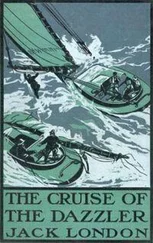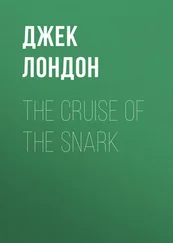Jack London - The Cruise of the Snark
Здесь есть возможность читать онлайн «Jack London - The Cruise of the Snark» весь текст электронной книги совершенно бесплатно (целиком полную версию без сокращений). В некоторых случаях можно слушать аудио, скачать через торрент в формате fb2 и присутствует краткое содержание. Жанр: Классическая проза, Морские приключения, на английском языке. Описание произведения, (предисловие) а так же отзывы посетителей доступны на портале библиотеки ЛибКат.
- Название:The Cruise of the Snark
- Автор:
- Жанр:
- Год:неизвестен
- ISBN:нет данных
- Рейтинг книги:3 / 5. Голосов: 1
-
Избранное:Добавить в избранное
- Отзывы:
-
Ваша оценка:
- 60
- 1
- 2
- 3
- 4
- 5
The Cruise of the Snark: краткое содержание, описание и аннотация
Предлагаем к чтению аннотацию, описание, краткое содержание или предисловие (зависит от того, что написал сам автор книги «The Cruise of the Snark»). Если вы не нашли необходимую информацию о книге — напишите в комментариях, мы постараемся отыскать её.
The Cruise of the Snark — читать онлайн бесплатно полную книгу (весь текст) целиком
Ниже представлен текст книги, разбитый по страницам. Система сохранения места последней прочитанной страницы, позволяет с удобством читать онлайн бесплатно книгу «The Cruise of the Snark», без необходимости каждый раз заново искать на чём Вы остановились. Поставьте закладку, и сможете в любой момент перейти на страницу, на которой закончили чтение.
Интервал:
Закладка:
His face lighted with pleasure and he uttered the single word, "Tahaa," turning at the same time and pointing to the lofty, cloud- draped peaks of an island three miles away—the island of Tahaa. It was fair wind over, but a head-beat back. Now I did not want to go to Tahaa. I had letters to deliver in Raiatea, and officials to see, and there was Charmian down below getting ready to go ashore. By insistent signs I indicated that I desired no more than a short sail on the lagoon. Quick was the disappointment in his face, yet smiling was the acquiescence.
"Come on for a sail," I called below to Charmian. "But put on your swimming suit. It's going to be wet."
It wasn't real. It was a dream. That canoe slid over the water like a streak of silver. I climbed out on the outrigger and supplied the weight to hold her down, while Tehei (pronounced Tayhayee) supplied the nerve. He, too, in the puffs, climbed part way out on the outrigger, at the same time steering with both hands on a large paddle and holding the mainsheet with his foot.
"Ready about!" he called.
I carefully shifted my weight inboard in order to maintain the equilibrium as the sail emptied.
"Hard a-lee!" he called, shooting her into the wind.
I slid out on the opposite side over the water on a spar lashed across the canoe, and we were full and away on the other tack.
"All right," said Tehei.
Those three phrases, "Ready about," "Hard a-lee," and "All right," comprised Tehei's English vocabulary and led me to suspect that at some time he had been one of a Kanaka crew under an American captain. Between the puffs I made signs to him and repeatedly and interrogatively uttered the word SAILOR. Then I tried it in atrocious French. MARIN conveyed no meaning to him; nor did MATELOT. Either my French was bad, or else he was not up in it. I have since concluded that both conjectures were correct. Finally, I began naming over the adjacent islands. He nodded that he had been to them. By the time my quest reached Tahiti, he caught my drift. His thought-processes were almost visible, and it was a joy to watch him think. He nodded his head vigorously. Yes, he had been to Tahiti, and he added himself names of islands such as Tikihau, Rangiroa, and Fakarava, thus proving that he had sailed as far as the Paumotus—undoubtedly one of the crew of a trading schooner.
After our short sail, when he had returned on board, he by signs inquired the destination of the Snark, and when I had mentioned Samoa, Fiji, New Guinea, France, England, and California in their geographical sequence, he said "Samoa," and by gestures intimated that he wanted to go along. Whereupon I was hard put to explain that there was no room for him. "Petit bateau" finally solved it, and again the disappointment in his face was accompanied by smiling acquiescence, and promptly came the renewed invitation to accompany him to Tahaa.
Charmian and I looked at each other. The exhilaration of the ride we had taken was still upon us. Forgotten were the letters to Raiatea, the officials we had to visit. Shoes, a shirt, a pair of trousers, cigarettes matches, and a book to read were hastily crammed into a biscuit tin and wrapped in a rubber blanket, and we were over the side and into the canoe.
"When shall we look for you?" Warren called, as the wind filled the sail and sent Tehei and me scurrying out on the outrigger.
"I don't know," I answered. "When we get back, as near as I can figure it."
And away we went. The wind had increased, and with slacked sheets we ran off before it. The freeboard of the canoe was no more than two and a half inches, and the little waves continually lapped over the side. This required bailing. Now bailing is one of the principal functions of the vahine. Vahine is the Tahitian for woman, and Charmian being the only vahine aboard, the bailing fell appropriately to her. Tehei and I could not very well do it, the both of us being perched part way out on the outrigger and busied with keeping the canoe bottom-side down. So Charmian bailed, with a wooden scoop of primitive design, and so well did she do it that there were occasions when she could rest off almost half the time.
Raiatea and Tahaa are unique in that they lie inside the same encircling reef. Both are volcanic islands, ragged of sky-line, with heaven-aspiring peaks and minarets. Since Raiatea is thirty miles in circumference, and Tahaa fifteen miles, some idea may be gained of the magnitude of the reef that encloses them. Between them and the reef stretches from one to two miles of water, forming a beautiful lagoon. The huge Pacific seas, extending in unbroken lines sometimes a mile or half as much again in length, hurl themselves upon the reef, overtowering and falling upon it with tremendous crashes, and yet the fragile coral structure withstands the shock and protects the land. Outside lies destruction to the mightiest ship afloat. Inside reigns the calm of untroubled water, whereon a canoe like ours can sail with no more than a couple of inches of free-board.
We flew over the water. And such water!—clear as the clearest spring-water, and crystalline in its clearness, all intershot with a maddening pageant of colours and rainbow ribbons more magnificently gorgeous than any rainbow. Jade green alternated with turquoise, peacock blue with emerald, while now the canoe skimmed over reddish purple pools, and again over pools of dazzling, shimmering white where pounded coral sand lay beneath and upon which oozed monstrous sea-slugs. One moment we were above wonder-gardens of coral, wherein coloured fishes disported, fluttering like marine butterflies; the next moment we were dashing across the dark surface of deep channels, out of which schools of flying fish lifted their silvery flight; and a third moment we were above other gardens of living coral, each more wonderful than the last. And above all was the tropic, trade-wind sky with its fluffy clouds racing across the zenith and heaping the horizon with their soft masses.
Before we were aware, we were close in to Tahaa (pronounced Tah-hah- ah, with equal accents), and Tehei was grinning approval of the vahine's proficiency at bailing. The canoe grounded on a shallow shore, twenty feet from land, and we waded out on a soft bottom where big slugs curled and writhed under our feet and where small octopuses advertised their existence by their superlative softness when stepped upon. Close to the beach, amid cocoanut palms and banana trees, erected on stilts, built of bamboo, with a grass- thatched roof, was Tehei's house. And out of the house came Tehei's vahine, a slender mite of a woman, kindly eyed and Mongolian of feature—when she was not North American Indian. "Bihaura," Tehei called her, but he did not pronounce it according to English notions of spelling. Spelled "Bihaura," it sounded like Bee-ah-oo-rah, with every syllable sharply emphasized.
She took Charmian by the hand and led her into the house, leaving Tehei and me to follow. Here, by sign-language unmistakable, we were informed that all they possessed was ours. No hidalgo was ever more generous in the expression of giving, while I am sure that few hidalgos were ever as generous in the actual practice. We quickly discovered that we dare not admire their possessions, for whenever we did admire a particular object it was immediately presented to us. The two vahines, according to the way of vahines, got together in a discussion and examination of feminine fripperies, while Tehei and I, manlike, went over fishing-tackle and wild-pig-hunting, to say nothing of the device whereby bonitas are caught on forty-foot poles from double canoes. Charmian admired a sewing basket—the best example she had seen of Polynesian basketry; it was hers. I admired a bonita hook, carved in one piece from a pearl-shell; it was mine. Charmian was attracted by a fancy braid of straw sennit, thirty feet of it in a roll, sufficient to make a hat of any design one wished; the roll of sennit was hers. My gaze lingered upon a poi-pounder that dated back to the old stone days; it was mine. Charmian dwelt a moment too long on a wooden poi-bowl, canoe-shaped, with four legs, all carved in one piece of wood; it was hers. I glanced a second time at a gigantic cocoanut calabash; it was mine. Then Charmian and I held a conference in which we resolved to admire no more—not because it did not pay well enough, but because it paid too well. Also, we were already racking our brains over the contents of the Snark for suitable return presents. Christmas is an easy problem compared with a Polynesian giving-feast.
Читать дальшеИнтервал:
Закладка:
Похожие книги на «The Cruise of the Snark»
Представляем Вашему вниманию похожие книги на «The Cruise of the Snark» списком для выбора. Мы отобрали схожую по названию и смыслу литературу в надежде предоставить читателям больше вариантов отыскать новые, интересные, ещё непрочитанные произведения.
Обсуждение, отзывы о книге «The Cruise of the Snark» и просто собственные мнения читателей. Оставьте ваши комментарии, напишите, что Вы думаете о произведении, его смысле или главных героях. Укажите что конкретно понравилось, а что нет, и почему Вы так считаете.







